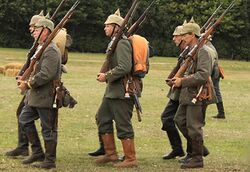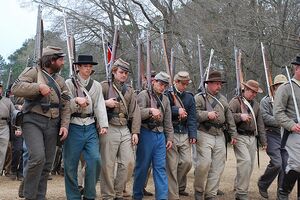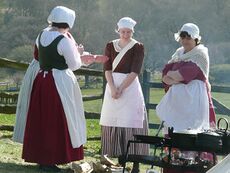HowTo:Reenact History

|
HowTo This article is part of Uncyclopedia's HowTo series. See more HowTos |
You are walking down by the antique mall and you see it in the display case: that hat, the one that would complete your costume. Oh, sure, you'd still need to buy the sabre, the cufflinks, an antique flask, a brass pocketwatch, and boots from a more reputable historical authority than the shoe department rep at Wal-Mart, but that hat: if you just had that on your head, you could follow your life-long dream of walking about the streets in obsolescent fashions and uttering words like "thou" and "whereupon" with impunity. Challenge any doubter and you could then profess history with the chime of authority, seeming like an expert on matters which you had just read about from Wikipedia that same morning.
So now stand to attention and button up! Remember you're a soldier!! You have joined the ranks of the few, the proud, the laughed-at-behind-their-backs: the historical reenactor.
Different Kinds of Historical Reenactors
Clubs
Some people coach sports; some people help build houses for the needy; you're the sort of person who wants to hear how fucking cool your voice sounds when you say olde tyme things. Good news: you're not alone! Whole clubs have sprung up full of history fans who want to use history as their own personal playground. Understand this: conformity is essential. You've brought your history book, right? Throw it away! The only historical account that matters is the one that is socially acceptable to your club mates.
Until you get broken in to their version of events, your sense of history is going to be constantly offended, but fear not - the following are examples of quandaries you may encounter, and solutions to help speed you past them:
- "We didn't have Wild West gunfights in Virginia!" - If you live in North America, get used to it: even if your heritage is of a group of harmless, grizzled, fossy-jawed settlers, it doesn't take long until someone starts loving the feeling of that painted wooden gun strapped to their thigh. Their fingers will itch a foot away from the holster and, perceiving an imaginary gong at noon, whoosh! Out comes the gun. If you have any NRA members in your group, they probably have a real gun (with blanks, if you're lucky). Go rent a few Clint Eastwood films to start learning what it is that your club mates are thinking of everytime the pretend to gunfight. If you don't have one, build a prop gun for your costume, and develop your western drawl. "You feel lucky, punk? Well, do ya?"[1] you'll find yourself challenging your reflection in the mirror. Once you've learned to embrace the gunfighting ethos, the history won't matter.
- "We can't all be generals, can we?" - If you're going to go to the effort of creating a military costume to join in your battle reenactment society, spending time researching period-appropriate accoutrements, and stitching on the rank insignia, then why would you want to end up being a jerk-ass private? Sure, low-level recruits were the most numerous in wars, but nobody cares about the little guy - it's the generals, the colonels, and the captains that consigned them all to senseless deaths that people find really interesting. If your costume denotes you as a grunt, this would tell your cohorts two things: one, you're too lazy to make yourself better rank insignia, and two, you're at the low end of the chain of command, so you'd better be prepared to take orders from anyone whose costume outranks yours (i.e. everyone else).
- "I thought, er, you know... those people didn't live here back then? - If one of your club mates is of a race or culture not present in the historical community, military, or class activity your club represents, well, tough shit! We're a better society now, and think of this as righting a historical wrong. Isn't it great that people like you have learned to allow people like them into your club? If anyone in your town of Bumblefüch asks, just BS something about him visiting from upriver (see Creative Solutions).
Paying Work
Museums
In places with history worth learning - you know, London, Rome, Beijing - you might make a decent amount of money working in a history museum, many of which enjoy full state funding. However, these facilities are too prestigious to employ a clown in a period outfit, and instead rely on the stern docent with white artifact gloves to remind you not to touch anything. That is not to say that the Europeans don't like the dressing up stuff, because they do, but at least they have a variety of time periods to chose from and take it seriously. Even the casual banter is regulated to conform with the historical age, so that rules out anachronistic slang and idioms.
As for the Americas, with their paltry five hundred years of recorded history, the world at large could not care less, and given the evils visited upon the indigenous natives, African slaves, and Asian immigrants, North Americans themselves tend to put their hands on their ears and go ♫la-la-la-la where history is concerned. In North America, restricting public funding to museums ensures that embarrassing history is not widely known, and that private funders can focus on FUN!!1!
In brief: don't expect to get paid to be an historical reenactor.
Historical Sites
There are historical sites dotting Canada and the United States in many hard-to-reach places that actually employ people to wear period outfits, however. Whether in forts, old houses, battlefields, or other localities of minor significance, these places are the black holes which suck in failed actors, Master of Arts degree holders, and old folks who left the modern world behind because touch-tone dialing was a step too far. If you're going to join this rogues' gallery, you had better start practicing to keep your job in this cut-throat profession by following these rules:
- Use old timey words like "thee", "thou", "thy", et al. whenever feasible.
- Spell words wrong by using any or all of the following (if your character is a simpleton, use as many as possible at once):
- An extra "e" as on the end of "towne"
- An unnecessary silent "k" as on the end of "publick"; optionally, replace "c's" with "k's" entirely
- Replace i's with y's where the latter is used as a vowel, as in "tyme"; "y" may conversely be replaced with "ie"
- Use "-eth" as a suffix on the end of verbs
- Et cetera. To help you prepare for your future career in historical reenactment, the rest of this section will be written in olde tyme speake.
- Yore charakter shall fall within one of several well-defined Northe Americkan stereotypes - learne thy role welle starting forthwith with the following:
- Towne Drunke - Thou shall frequent the bawdy or the publick house, and be seen to swagger in the square with bottle in hande.
- Law Man - Thy schtick shall be to find a familie, clappeth the father in irons to his surprise, and put him in jail for them to take amused photographic pictures of his plight.
- Governor - Roughly same as Towne Drunke.
- Preacher Man - Ask visitors about embarrassing sins which they hath committed; and ask teenage girls if they have come to be wed to the young man whom ye shall knowe to be her brother but pretendeth ignorance thereof.
- School Marm - Stricktly enforceth olde tyme school rules
Theme Restaurants
There is one last option if you want to reenact "history" and be paid for it. Many middle-class North Americans and poorly-funded elementary schools adore theme restaurants like Medieval Times. For the yearly subscription cost of an informative magazine, a patron may instead turn off their brain for a few hours, eat with their own grubby little hands, and enjoy the SHINY METAL and HORSES and LOUD NOISES!!!1!!11! As long as public funding for museums sucks, it is up to the private sector to 'edutain' people, and you can get in on the ground floor.
Random Crazies
Your town might have a person or people who wear clothes which are decades out of fashion for reasons other than poverty. If you live in San Francisco, this is completely normal and if they are cunning enough, they can even get the locals to make you the head of state (see Emperor Norton). In other communities, there are individuals who wear historical costumes like regular clothes. Take photos, but try not to get too close. If they try to offer you free history, accept it graciously, listen as long as you can bear to, and when possible, back away from them. Do not break eye contact until you are at least 20 metres away.
If you are this roving costumed person, here are some guidelines:
- People may not realize when you ask for spare change that you really want it. After all, what would an old timey person want with modern day money?
- If people want a photo with you, it is customary to feign ignorance of what a camera is, or make excited hoots about how you have never seen such a small daguerreotype device.
- Don't be offended if children seem frightened of you. Adults are, too, they are just better at hiding it.
- Even though people in the past did not bathe, you still should.
Professional Standards
"Forbidden" Items
You might think that you're providing a vital public service by talking to the public, but the real reason people talk to you is for the fun of breaking your character. The fun for you is seeing how long you can stick a rigidly, unwaveringly in character. The following are things that make it easy to spot a historical phoney:
Wrist watch - Wrist watches were predominantly feminine accessories until the First World War. If you are a man wearing a costume of a period before that, the public would be quite right to mock you as a nancy-boy for wearing a wrist watch.
Cell phone - Do you not find it a little bit distressing that you fear to be without your cell phone for even just a little while at a time? Seriously, leave the thing with your civilian clothes - the world will not end, no babies will die.[2]
Camera - It isn't just the tourists who want pics! Sometimes you will be overcome with just how awesome you look/feel in costume. Just be sure that you have a pouch or pocket to put your camera in when no one is looking, and if anyone asks what's in it, say: "opium." That should help you avoid any trouble.
Creative Solutions
Oral communication is exhausting, and Lord knows the world would be better if we could just learn to text message as our primary mode of communication. Until that brave day comes, you're stuck with primitive noise exchange to explain things to people. It's an imperfect system, and will inevitably lead to problems. Read below to help prepare for the most common ones.
Circumstance: Spectators get in your personal space and start pawing over your costume without consent, fawning over its old-timeyness.
- Your response: Start feeling them up, especially if you find them attractive. One of the most important rules of your profession is to make remarks about how strange their clothes seem, perhaps comparing casual summer clothes to pyjamas of yore. This, plus the fact that they're in your personal space feeling up your costume, may give you grounds to ask if they are trying to get you to bed.
Circumstance: Spectator says to you: "Women weren't allowed to do that back then!"
- Your response: Some people genuinely believe that women in the past were little more than automatons who routinely prepared food, cleaned house, and had babies.[3] In the present day, a lot of men are too manly to work in costumed jobs, so you find a lot of women in costume doing work that men used to consider too manly for women to do. If spectators are bothering you as a female costumed reenactor, cry out melodramatically, "Oh, yes, bless me, but these manly tasks are wont to make me swoon!" Place the back of a hand limply on your forehead and, sighing, collapse to the ground. To show solidarity, any male co-workers with you should do the same.
Circumstance: Spectator asks you humiliating questions or requests that you perform humiliating acts for their amusement.
- Your response: If the spectator is male, he may suffer from hypogonadism; you are now engaged in a pissing content, and it will not take much to outsmart him. If you are a military reenactor, make yourself look tough with your knowledge of guns; if you are playing a more prissy character, invite the man to tea, and then cut him off at the knees for every infraction of good etiquette. If the spectator is a female, see if she has bare skin showing other than the hands or head, bare ankles, or obvious make-up on her face; in finding any of these, you now have grounds to call her a prostitute in character, and decline her requests on the grounds that your reputation could not brook such infamy.
Circumstance: A spectator asks you a question to which you do not know the answer.
- Your response: Make stuff up! People will believe anything you tell them, as long as you sound like you believe it. Wild assumptions? "Educated" guesses? Pass them off as the truth. That costume you are wearing is a symbol that you know everything and people will want to believe you. But, for good measure, change the subject as soon as possible to something you do know a lot about - this is not about what the spectator wants to learn, but about what you want to tell them.
Summary
Well, you've followed your calling, and kudos to you. It's not everyone who can devote themselves to something so ultimately vain as decorating themselves in historical garb and demanding audience attention while they loquaciously indulge in historical minutiae that has little bearing on the modern world. But you did it! And not for the piles of money that you are sure to be paid, no, no: you did it to live in the moment. Er, the moment that passed centuries ago, but yes! People came to you to learn, and in the end, they know more stuff than before, even if they don't know what to make of it. Kudos! Now get out there, and do what that arts degree destined you to!
Footnotes
| Featured on the 19th of February 2011 | |
This HowTo has been featured on the HowTo: namespace. Want to know HowTo get your own HowTo featured? Just write something good.
| |
| Featured version: 19 May 2011 | |
| This article has been featured on the main page. — You can vote for or nominate your favourite articles at Uncyclopedia:VFH. | |







